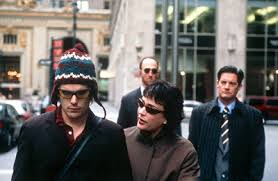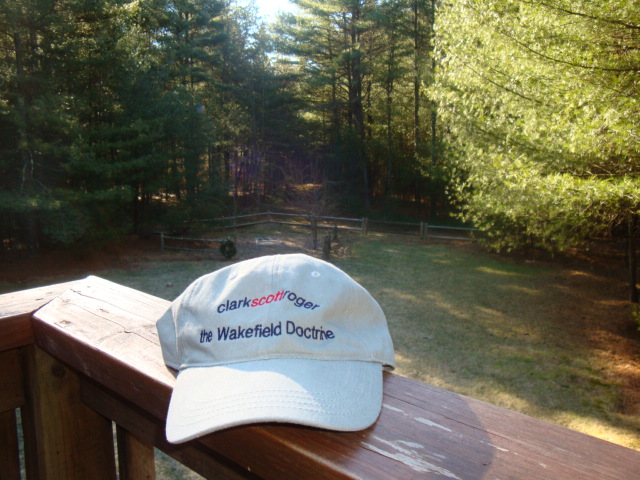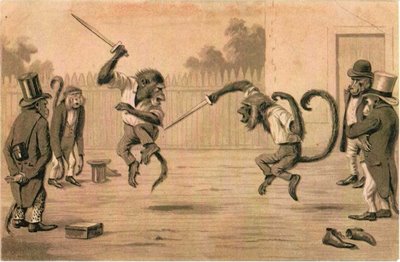Welcome to the Wakefield Doctrine (the theory of clarks, scotts and rogers)
We went back to March 2010 for today’s reprint.
A few yellow-highlights:
- Mimi hit the nail on the head, (of course!), with her observation yesterday, vis-à-vis, rogerian expressions causing one to laugh. The oddly explosive laughter that follows one’s encounter with a true rogerian expression is their signature identifyer.
- the Wakefield Doctrine is for you, not them
- today you’ll be in the midst of clarks, scotts and rogers (To be a bit more precise: you’re surrounded by rogers, should stay alert to any nearby scotts and are, in all likelihood, a clark)
- on with the reprint!
(title: ‘on with the hats’)
There is much to talk about but first, the fun of fashion, Doctrine Style. Envy the owners of the scottian heads that will soon be adorned by this fine hat.
Look on this, and feel the desire grow within your heart on behalf of your un-hatted head. Pretty nice, you say? Damn right is pretty nice. Maybe even too nice!
The lucky two with these hats (Ms. AKH and Ms. Pixieblonde) are both fortunate and deserving of your envious thoughts, you should accept that you must earn such fashion. There will be new opportunity for both Men and Women of the clarklike, scottian and rogerian varieties, to earn such headcoverings.
Alright, enough with the hats already. They have theirs and you can get yours if you really want to, but we are not here, writing this to sell hats.
We are here writing this to sell* the Wakefield Doctrine (aka the theory of clarks, scotts and rogers).
And by *sell we mean present to as many as qualified** people as possible the principles and practical applications*** of said Doctrine.
And by **qualified we mean people who upon visiting this blog and reading it’s content are capable of loosening the grip of dogma enough to allow the overlay of the description of the world that the Doctrine offers.
And by ***principles and practical applications of the Doctrine, we mean it offers an alternative, an adjunct to the way most of us interpret the actions, behaviors and intentions of the people we live and work and play with every day of our lives****.
And by****lives, we mean the increasingly rigid lens through which we not only perceive the world we exist in, but we also use as the template which informs our experiences as we live our lives.Let’s talk about practical applications (of the Doctrine)….the Doctrine tells us that only one of the three (clarks, scotts and rogers) consider a tool that is useful in altering themselves (and thereby their realities) to be a valuable thing. In other words to change themselves. You know who you are.
Another of the three will, if engaged sufficiently in the Wakefield Doctrine, consider the most valuable is as a tool to change others, changing the view that the world has of them.
Finally, the third (of the three) will view the Doctrine as a tool, a weapon, to aid them in dealing with the hostile world they live in.Tired? Bored? You want what? Come on people, learn first then have fun.
(Alright…damn, I wonder if Rev Moon had to put up with this…alright…short break for you attention-span challenged Readers….I see you out there scott. Jeez, try to bring the Secret of the Universe to the masses and what do you get…”More videos!!” and they are not even mine, if it wasn’t for the youtube we probably would have been shut down months ago.)
OK. Back to work.
… lets get all Readers Digest on this thing.
- clarks live inside their own heads because it’s all much better in there
- clarks are the only (one of the three) to sincerely entertain the idea that it would be better to be someone else
- clarks read a lot and to say that clarks daydream a lot is to totally go redundant
- clarks work very hard at whatever they do but since we are bored very easily, do not do well at repetitive tasks
- clarks are the creative one(s) of the three
- clarks share, to a fault
- clarks believe that if they work hard and help others unselfishly at some point they will no longer be different
- ‘knowledge is power’ is a keystone concept to clarks
It can be said that clarks can believe anything and therefore believe in nothing. (If you know what that means, you are a clark).
yeah here too, lets get all Readers Digest on this thing.
- scotts are leaders (because they are certain, not necessarily right, but certain).
- scotts are self-confident/self-assured/certain (which is why, of course, they are the leaders)
- scotts are emotional in a way different from rogers, it is for the moment emotion, not much grudge holding
- in a band it is always a scott who is the ‘front man’, (see leader above)
- at a party scotts will not hesitate to introduce themselves (to everyone)
- for the most part, when confronted with a threat or other fear-generating situation, a scott will choose to attack rather than flee
- scottian females can be ridiculously sexy or quick witted, hardly ever both.
- (female) scotts can be spotted because they have prominent throat tendons (ask us why)
One of the most useful metaphors in the Wakefield Doctrine is: grouping (when you have more than one of each type, what do the characteristics tell us about the individual?)
a group of scotts is a pack
you gotta like the form, its a fucking bullet list, but lets get all Readers Digest on this thing.
- rogers are the friendly ones
- rogers are the glue to whatever social fabric you might care to consider, civic, religious, scientific
- rogers require rules and traditions, they are in fact the only ‘reason’ that history of human civilization has any continuity whatsoever
- rogers are behind the creation or and perpetuation of virtually all human institutions, religious, civic, political whatever
- rogers do not create, they maintain, they assemble, they are the machine operators
- rogers are the engineers, accountants and physicians
- rogers are the judges, the firefighters and high school teachers (except for gym teachers)
- rogers believe in a quantifiable universe to such a depth that it is not seperable
- when you are new to a neighborhood, rogers are the ones who come over to introduce themselves, and they will appear in a group ( herd), the scotts are the neighbors who always offer to help you with projects, scotts will feel comfortable asking to borrow and offering to lend things, but they will show up (at your house) alone.
Herds, rogers be in herds…
Well, that is helpful, no?
Alright, we have covered a lot of ground. No, there will be no questions from the floor, roger. The eyes I see have a distinct glaze.
But in all seriousness, read this shit and look around you today, right now. Pick one person only and decide whether they are a clark, scott or roger. And keep checking their behavior against the Doctrine. I guarantee that once you find one, the others will be much more obvious. You will probably spot a roger first, but any of the three will do. Personally, I think it would be easier and more fun to spend a little extra time and find your nearest clark. (The clarklike females are totally easy to spot). Don’t bother with which of the three you are at this point. Not important. You just want to spot the clarks, and the scotts and the rogers around you. Like one of those old puzzles in the back of kids magazines or Sunday supplements, “Find the tigers in the jungle”; once you discern the first pattern, the rest jump out at you.
Now don’t think we don’t know that which of the three (clarks, scotts or rogers) you happen to be, will have an effect on how you respond to this…but by virtue of the fact that you are still reading, still with us is proof that you have what it takes to apply the Doctrine in your own life.
Good luck, don’t forget the contest and don’t worry so much…
*











